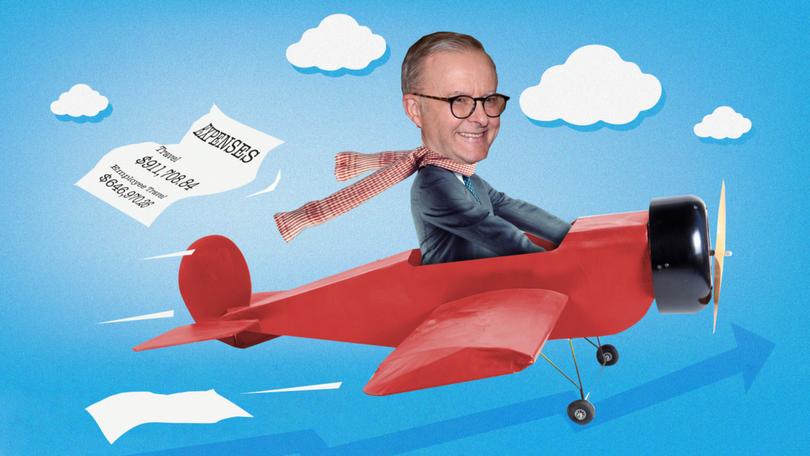Prime Minister Anthony Albanese’s travel cost taxpayers $1.8m in just three months, but details stay secret
Anthony Albanese’s travel costs for one three-month period have been revealed, but a crusader for transparency can’t get clarity on where ministers have been jetting.

Anthony Albanese charged taxpayers more than $1.8 million to cover travel costs and other expenses in just three months last year, but the full details of his spending remain remain secret despite one former senator’s repeated attempts to broker greater transparency.
In two separate data dumps recently made public but otherwise unreported, it can be revealed the Prime Minister clocked up a $967,630 bill for special purpose flights — run through the Australian Air Force — for 112 hours of domestic travel and almost 68 hours of international travel between July 1 and September 30 last year; as well as almost $912,000 in other expenses including accommodation, office materials and car costs.
Deputy Prime Minister and Defence Minister Richard Marles, whose SPA flights bill came under the spotlight last year, had the second highest bill after the PM — $274,564 — for almost 22 hours of international travel and 45 hours of domestic travel in the quarter.
Sign up to The Nightly's newsletters.
Get the first look at the digital newspaper, curated daily stories and breaking headlines delivered to your inbox.
By continuing you agree to our Terms and Privacy Policy.Meanwhile, Foreign Affairs Minister Penny Wong’s bill came in at $233,214 for 15 domestic hours and 41 international hours.
In total, 14 ministers spent $2.149m on special-purpose aircraft flights during the three months.
But the exact details of where they flew, and who they flew with, remain secret.
Changes to the disclosure log made during the Morrison government limit what details of SPA flights are made available to the public due to security concerns, but the “secrecy” around ministerial VIP flights is now the subject of a challenge before the Administrative Appeals Tribunal by former South Australian senator Rex Patrick.
The self-described “transparency warrior” is challenging freedom-of-information decisions to keep details of specific flights made by Mr Albanese and Mr Marles secret, with Mr Patrick arguing that public spending related to public assets should be able to be scrutinised by the public.
In February 2022, the security co-ordination group agreed that “special purpose aircraft guidelines are not currently fit-for-purpose in regards to protecting security sensitivities, including demonstrating a protection of pattern of life data be amended”, agreeing to amend the 2013 guidelines to water down the requirements of what data must be made public every six months.
Mr Patrick has routinely criticised the “one-sided argument” of keeping flight details secret out of security concerns, rather than “focusing on the benefits of transparency”, noting the SPA flight disclosures are published at least six months to a year after the fact.
He said Australians had a right to know whether, for example, a number of Cabinet ministers took separate VIP flights to the same location — as was the case in March when Energy Minister Chris Bowen and Mr Albanese hitched separate rides to the Hunter region “on RAAF advice” — or if they took flights that had reasonable domestic alternatives (Prime Minister excluded).
“You don’t want the flights to be used for improper purposes, and one of the ways to detect abuse is to understand where people went,” Mr Patrick said.
“If there is transparency in place, then ministers and officials are less likely to do something improper, so it serves as a deterrent — if they know the flights are fully transparent, they are unlikely to do anything out of order. If those are opaque, ministers and officials may well think they can get away with misuse.”
The Nightly is not suggesting the Prime Minister or any Cabinet ministers are misusing the special purpose aircraft facilities available to them.
A Government spokesperson said Labor was “absolutely committed to transparency”.
“Our focus has been on ensuring that the Government is held accountable for the use of a public asset and that any reporting balances the need for transparency with the need to meet security requirements,” the spokesperson said.
While the flight details will likely remain secret, the latest tranche of the Independent Parliamentary Expenses Authority data released this week reveals Mr Albanese charged taxpayers $161,259.75 to cover accommodation, meals, ground transport, and other incidentals during his trips to Europe, the Middle East, New Zealand, India, Indonesia, the Philippines, and the United Arab Emirates for various summits and bilateral meetings between last June and September.
His 61 employees spent almost $647,000 on travel — more than $536,000 of which was for domestic purposes.
Back at home, he charged taxpayers $7800 for 13 nights in hotels around the country — including a night in Adelaide before he launched the official Voice to Parliament campaign — and $27,479.60 on ComCars.
Parliamentarians more broadly spent almost $45m of taxpayer’s money in the quarter, with Labor clocking up $20m in expenses, the Coalition $15.7m, and the Greens and independents a combined $5.54m.
Between the 151 MPs and 76 senators, more than $1.7m was spent on “other car costs”, namely the use of ComCars and lease rentals, but details of where they travelled in the taxpayer-funded vehicles is also not public information.
One ComCar charge made by Mr Marles, who was top of the list for this charge category, came to $1,152.90 but is listed only as “Brisbane”, because that was the car’s origin.
Similarly, Kennedy MP Bob Katter — whose electorate spans 567,377 km2 — made a $1576.82 ComCar trip listed only as “Brisbane”.
Mr Patrick wants greater transparency restored to how expenses are reported.
“If parliamentarians are spending public money, the public is entitled to know,” he said.
A Government spokesperson said Labor had worked hard to return transparency to the system, arguing the set-up provides “significant detail” about expenses.
“Accurate and timely reporting of parliamentary expenses is a key pillar of our transparent democratic system,” the spokesperson said.

